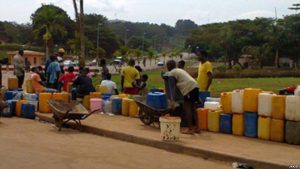by Britt Lipson
In 2013, I had a unique and life-changing experience. For most of the year, I volunteered at an orphanage school in Buea, Cameroon. No, it was not a mission trip or a study abroad year. No, I did not go with friends or family. No, I did not know anyone there. When I share this experience with people, they look at me in awe. They’re usually appalled that someone would give up their savings and time to travel to a 3rd world country. Most people label me as brave, but I didn’t feel courageous. In fact, if I’m being honest, I felt a certain amount of anxiety run through my body. Although difficult to explain, I will try my best.
I felt a calling since I was a child. Africa was a fascination to me, and I felt compelled to visit. My childhood was by no means easy, but I can’t imagine struggling for food and water. I wanted to assist those who didn’t have access to these basic necessities, and I felt like this experience would be meaningful. I was going to a place where water was scarce, a cherished rarity. When in Cameroon, it common for the government to turn the water off, and for the community to have to make do with the little they had. When I stayed there for a year, I conserved water in a large bin, not knowing when the water would be turned back on.
In anticipation of this event, we would prepare by trekking to a well under the scorching sun. I needed water because I was often parched and dehydrated thanks to the sweltering African heat. I would trek three miles from the school where I was volunteering with my cherished bottle of water in my bottle in hand. I did my best to conserve my water use each day, but I had a host mother close by. I would often visit, and she would cook her usual meal of rice and beans. It was a difficult meal to cook because water was not always available. There were various buckets for cooking, drinking, and bathing. Warm water was out of the question. I would normally stand in the bathtub and rinse off soap with water, chilling my body. It sounds uncomfortable, but really it was refreshing. To shiver from the frigid water, then to get dressed and go outside to face the angry African sun was an unforgettable feeling, like a tug of war for my body and mind.
I was fortunate enough to be able to afford bottled water, selling at 10 cents each. To people who receive 50 dollars each month to support their entire family, this option is out of the question. As a result, sometimes they would drink stagnant water or water that was contaminated and hope they would not fall ill. If that happened, then they need to get medicine which they cannot afford. As a result, they missed work. If they had access to clean water, none of this would have been an issue.

Residents of Cameroon’s capital Yaounde often queue for hours to fill jerry cans with water during periods of severe shortages. (UNICEF)
Upon completion of my volunteer experience, I returned home with a mix of bliss and joy. My broken heart alternated between sadness and happiness. I felt fortunate not to worry about water. In my hotel, I made a mad dash for the shower where I took a long, boiling shower. The hot water pouring on my back felt foreign after nearly a year. I was also racked with guilt. I stepped out of the shower with the steam enveloping me like a warm blanket, fighting angry tears to stop them from pouring. I knew my perspective on water had changed. My habits changed from then on. When I brush my teeth, I turn the water off. I have a timer in my shower to limit my time to five minutes. These are small changes that don’t solve the global problem, but I know I’m making a difference by conserving water locally.
U.N. Water, which coordinates the annual World Water Day campaign, reports that there are over 663 million people in the world living without a safe water supply close to home, spending countless hours queueing for or trekking to distant sources, and coping with the health impacts that come with using contaminated water. This is according to Water Shortages Plague Major Cameroon Cities. I often read articles like that to remind me how lucky I am. We take accessible water for granted. I am thankful I had the opportunity to experience living with water scarcity. I wish everyone did.


